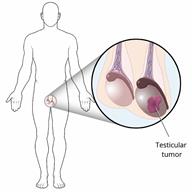Testicular Cancer

Testicular cancer is the presence of a cancerous (malignant) tumor in one or both of the male sex glands that produce testosterone and sperm (testicles). A tumor is an abnormal growth of cells and tissue. Testicular cancer is the most common cancer in men ages 15–34 years old and the second most common cancer in men ages 35–39 years old.
What are the causes?
The cause of this condition is not known.
What increases the risk?
The following factors may make you more likely to develop this condition:- Having had an undescended testicle.
- Having had abnormal development of the testicles.
- Having had testicular cancer in the past.
- Having a family history of testicular cancer, especially a father or brother.
- Having Klinefelter syndrome. This is a condition in which a male child shows some female characteristics.
- Being white (Caucasian).
- Having the HIV infection.
What are the signs or symptoms?
Symptoms of this condition include:- Swelling of the scrotum.
- A change in how your testicle feels.
- A painless bump or swelling in the testicle.
- Dull ache or feeling of heaviness in the lower abdomen.
- Pain or discomfort in the testicles or scrotum.
- Sudden buildup of fluid in the scrotum.
- Growth of breast tissue. The breast area may feel painful or sore.
- Lower back pain.
- Shortness of breath
- Chest pain.
- A cough.
- Abdominal pain.
- Headache.
- Feeling confused.
How is this diagnosed?
This condition is diagnosed based on your medical history and a physical exam, which will include checking your testicles for lumps, swelling, or pain. You may also have tests done, including:- Ultrasound of the testicles.
- A blood test that looks for substances that are linked to specific types of cancer (serum tumor marker test).
- A surgical procedure to remove the entire testicle in order to test it for cancer cells (radical inguinal orchiectomy).
- Imaging tests such as X-rays, CT scan, MRI, or bone scan.
- The size of the tumor.
- Whether or not the cancer has spread.
- Where the cancer has spread.
How is this treated?
Once your cancer has been diagnosed and staged, you should discuss a treatment plan with your health care provider. Based on the stage of the cancer, one treatment or a combination of treatments may be recommended. The most common forms of treatment are:- Surgery.
- Radiation therapy.
- Chemotherapy.
- High-dose chemotherapy followed by stem cell transplant.
Certain treatments for testicular cancer can cause infertility, a condition that could become permanent. Talk to your health care provider about the risks of treatment and your options if you want to have children.
Follow these instructions at home:
-
Take over-the-counter and prescription medicines only as told by your health care provider.
-
Maintain a healthy diet. Talk with your dietitian, or your health care provider, about what dietary choices are best for you.
-
If you have to go to the hospital, let your cancer specialist know.
-
Consider joining a support group. This may help you learn to cope with the stress of having testicular cancer.
-
Seek advice to help you manage treatment side effects.
-
Keep all follow-up visits. This is important.
Where to find more information
-
American Cancer Society: www.cancer.org or 1-800-227-2345.
-
National Cancer Institute: www.cancer.gov or 1-800-4-CANCER.
Contact a health care provider if:
-
You have a dull ache or feeling of heaviness in your lower abdomen or groin.
-
You have a sudden buildup of fluid in your scrotum.
-
You have new symptoms such as headache, abdominal pain, or lower back pain.
Get help right away if:
-
You have an increase in pain, discomfort, or swelling in your testicle or scrotum.
-
You have a cough, shortness of breath, or chest pain.
-
You feel confused.
Summary
-
Testicular cancer is the presence of a cancerous (malignant) tumor in one or both of the male sex glands that produce testosterone and sperm (testicles).
-
Once your testicular cancer has been diagnosed and staged, you should discuss a treatment plan with your health care provider.
-
Based on the stage of the cancer, one treatment or a combination of treatments may be recommended. The most common forms of treatment are surgery, radiation therapy, chemotherapy, and high-dose chemotherapy followed by stem cell transplant.
This information is not intended to replace advice given to you by your health care provider. Make sure you discuss any questions you have with your health care provider.

